Accelerate > Publications
Search this online library featuring the latest FAO publications, issue papers and briefs which offer up-to-date knowledge and innovative insights for SDG acceleration.

The State of Food Security and Nutrition in the World 2023 - Urbanization, agrifood systems transformation and healthy diets across the rural–urban continuum
2023
This report provides an update on global progress towards the targets of ending hunger (SDG Target 2.1) and all forms of malnutrition (SDG Target 2.2) and estimates on the number of people who are unable to afford a healthy diet. Since its 2017 edition, this report has repeatedly highlighted that the intensification and interaction of conflict, climate extremes and economic slowdowns and downturns,...
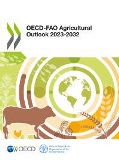
OECD-FAO Agricultural Outlook 2023-2032
2023
The Agricultural Outlook 2023-2032 is a collaborative effort of the Organisation for Economic Co-operation and Development (OECD) and the Food and Agriculture Organization of the United Nations (FAO). It brings together the commodity, policy and country expertise of both organisations as well as input from collaborating member countries to provide an annual assessment of the prospects for the coming decade of national, regional and global agricultural commodity markets.
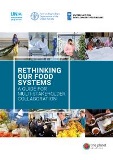
Rethinking our food systems: A guide for multi-stakeholder collaboration
2023
This guide aims to support stakeholders working at all levels of the food system in the implementation of actions to transform their food systems. Centered on 5 building blocks underpinning successful multi-stakeholder collaboration for food systems transformation, the guide uses these constructions to illustrate ingredients of the process and show the interconnectedness of the steps needed to be successful.
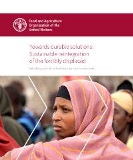
Towards durable solutions: Sustainable reintegration of the forcibly displaced
2023
This brochure provides an overview of FAO’s approach to supporting the sustainable reintegration of the forcibly displaced. It is part of a series of briefs on durable solutions, which highlight key approaches to forced displacement programming and policy, including tailored approaches to partnerships, data and evidence, with a view to achieving durable solutions to forced displacement including when conditions allow for a safe and dignified return.
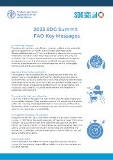
2023 SDG Summit: FAO Key Messages
2023
The 2023 SDG Summit will serve as a pivotal event towards achieving the SDGs, as gathered Heads of State and Government are to carry out a comprehensive review of progress, respond to the impact of multiple crises, and provide high-level political guidance on transformative and accelerated actions for achieving the 2030 Agenda. FAO has developed these key messages to inform the discussions in the lead up to and during this Summit and the Political Declaration which will result from them.
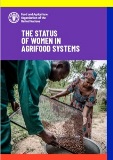
The status of women in agrifood systems
2023
This new FAO report provides a comprehensive picture of the status of women not only in agriculture, but across agrifood systems. It presents extensive data and lessons learned about gender in agrifood systems, with particular focus on how women participate in and benefit from socio-economic opportunities.
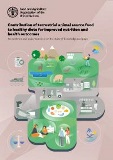
Contribution of terrestrial animal source food to healthy diets for improved nutrition and health outcomes - An evidence and policy overview on the state of knowledge and gaps
2023
FAO’s Committee on Agriculture requested a comprehensive, science- and evidence-based global assessment of the contribution of livestock to food security, sustainable food systems, nutrition and healthy diets, considering environmental, economic and social sustainability. The assessment consists of four component documents. This first component document provides a holistic analysis of the contribution of terrestrial animal source food to healthy diets for....
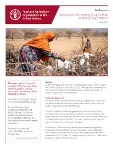
Importance of investing in agriculture in emergency contexts
2023
With 222 million people experiencing high acute food insecurity across 53 countries, and an alarming food security outlook for 2023, investing in agriculture in emergency contexts has never been so critical. Agriculture assistance is life-saving. It is significantly less expensive to help rural families produce food, than to provide them food.
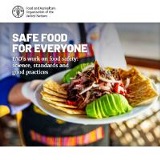
FAO's work on food safety: science, standards and good practices
2023
A life necessity, a social event, an act of love, a way of expressing ourselves: food is all of these things, as well as an important source of employment and the heartbeat of every economy. But the food chain – growing, harvesting, processing, packaging, transporting, distributing, trading, purchasing, preparing, consuming, and eventually disposing of what we consume – is a fragile sequence in which every point is fraught with risk....
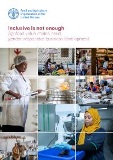
Inclusive is not enough – Agrifood value chains need gender-responsive business development
2023
This brief, jointly developed by the FAO Regional Office for Africa and the FAO Regional Office for the Near East and North Africa, aims to trigger a critical reflection on the concept of “inclusive” agribusiness and propose a new definition that highlights the importance of considering gender equality and women’s empowerment as an integral component of agribusiness development.

Enhancing nutrition in emergency and resilience agriculture responses to prevent child wasting - FAO's child wasting prevention action plan (2023–2024)
2023
As part of the United Nations Global Action Plan on Child Wasting, FAO requires USD 500 million to implement its action plan to prevent child wasting (2023–2024) in the 15 most-affected countries. FAO aims to reach 1 million vulnerable households with at-risk children, pregnant and lactating women and girls to prevent child wasting or to ensure that there are no relapses for children discharged after undergoing treatment.
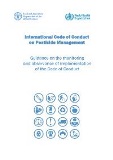
International Code of Conduct on Pesticide Management - Guidance on the monitoring and observance of implementation of the Code of Conduct
2023
The objective of this guidance on fulfilling the reporting requirements of Article 12 of the Code of Conduct is to obtain a regular flow of information on its observance to strengthen implementation of the Code, to provide data for its future revisions and improvement, and, most importantly, to improve the protection of human health and the environment related to pesticide use and management in agriculture and public health.
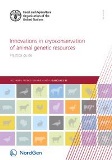
Innovations in cryoconservation of animal genetic resources - Practical guide
2023
The livestock sector faces a range of challenges, including climate change, emerging diseases, competition for natural resources and evolving demand for animal-source foods, which is increasing globally, especially in developing countries. Genetic diversity of livestock is a key resource for allowing livestock keepers to address these challenges, but this diversity has been in a state of decline...
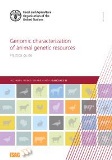
Genomic characterization of animal genetic resources - Practical guide
2023
Molecular biotechnologies have developed rapidly and substantially since the release of these previous guidelines. The livestock sector has been an active participant in the so-called “genomic revolution.” Advancements in the sequencing of genomes and related genotyping methods have created opportunities for gathering much more information on the molecular level than ever possible, at a faster rate, and for exponentially decreased costs.
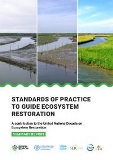
Standards of practice to guide ecosystem restoration: A contribution to the United Nations Decade on Ecosystem Restoration
2023
The United Nations Decade on Ecosystem Restoration 2021–2030 (hereafter “UN Decade”) recognizes the critical need to prevent, halt and reverse the degradation of the world’s ecosystems. Effective restoration of degraded ecosystems is of paramount importance for recovering biodiversity, ecosystem health and integrity, ecosystem goods and services, climate-change mitigation and human health and well-being.

Progress on the level of water stress. Global status and acceleration needs for SDG indicator 6.4.2, 2021
2023
The global indicator on water stress tracks the level of pressure that human activities exert over natural freshwater resources, indicating the environmental sustainability of the use of water resources. A high level of water stress has negative effects on social and economic development, increasing competition and potential conflict among users. This report is part of a series that tracks progress towards the various targets set out in SDG 6 using the SDG global indicators.
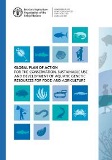
Global Plan of Action for the Conservation, Sustainable Use and Development of Aquatic Genetic Resources for Food and Agriculture
2022
This Global Plan of Action for the Conservation, Sustainable Use and Development of Aquatic Genetic Resources for Food and Agriculture (GPA) was developed by FAO at the request of the members of the Commission on Genetic Resources for Food and Agriculture in response to the needs and challenges identified in the first global assessment of the status of Aquatic Genetic Resources for Food and Agriculture (AqGR).

Aspirational principles and criteria for a sustainable bioeconomy
2022
To promote the production, utilization, conservation and regeneration of biological resources in ways that support global food and nutrition security and sustainable development, it is necessary to have a holistic vision for a sustainable and circular bioeconomy. Through the International Sustainable Bioeconomy Working Group (ISBWG), a multistakeholder group established in 2016,...
Browse by SDG
- SDG1: No Poverty
- SDG2: Zero Hunger
- SDG3: Good Health & Well-being
- SDG4: Quality Education
- SDG5: Gender Equality
- SDG6: Clean Water & Sanitation
- SDG7: Affordable and Clean Energy
- SDG8: Decent Work and Economic Growth
- SDG9: Industry, Innovation and Infrastructure
- SDG10: Reduced Inequalities
- SDG11: Sustainable Cities and Communities
- SDG12: Responsible Consumption and Production
- SDG13: Climate Action
- SDG14: Life Below Water
- SDG15: Life on Land
- SDG16: Peace, Justice and Strong Institutions
- SDG17: Partnerships for the Goals
Browse by Better
Browse by Priority Area
- Innovation for Sustainable Agriculture Production
- Blue Transformation
- One Health
- Small-Scale Producers' Equitable Access to Resources
- Digital Agriculture
- Healthy Diets for All
- Nutrition for the Most Vulnerable
- Safe Food for Everyone
- Reducing Food Loss and Waste
- Transparent Markets and Trade
- Climate Change Mitigating and Adapted Agrifood Systems
- Bioeconomy for Sustainable Food and Agriculture
- Biodiversity and Ecosystem Services for Food and Agriculture
- Achieving Sustainable Urban Food Systems
- Gender Equality and Rural Women's Empowerment
- Inclusive Rural Transformation
- Agriculture and Food Emergencies
- Resilient Agrifood Systems
- Hand-in-Hand Initiative
- Scaling up Investment

.tmb-th600x450.png?Culture=en&sfvrsn=7221663c_1)
